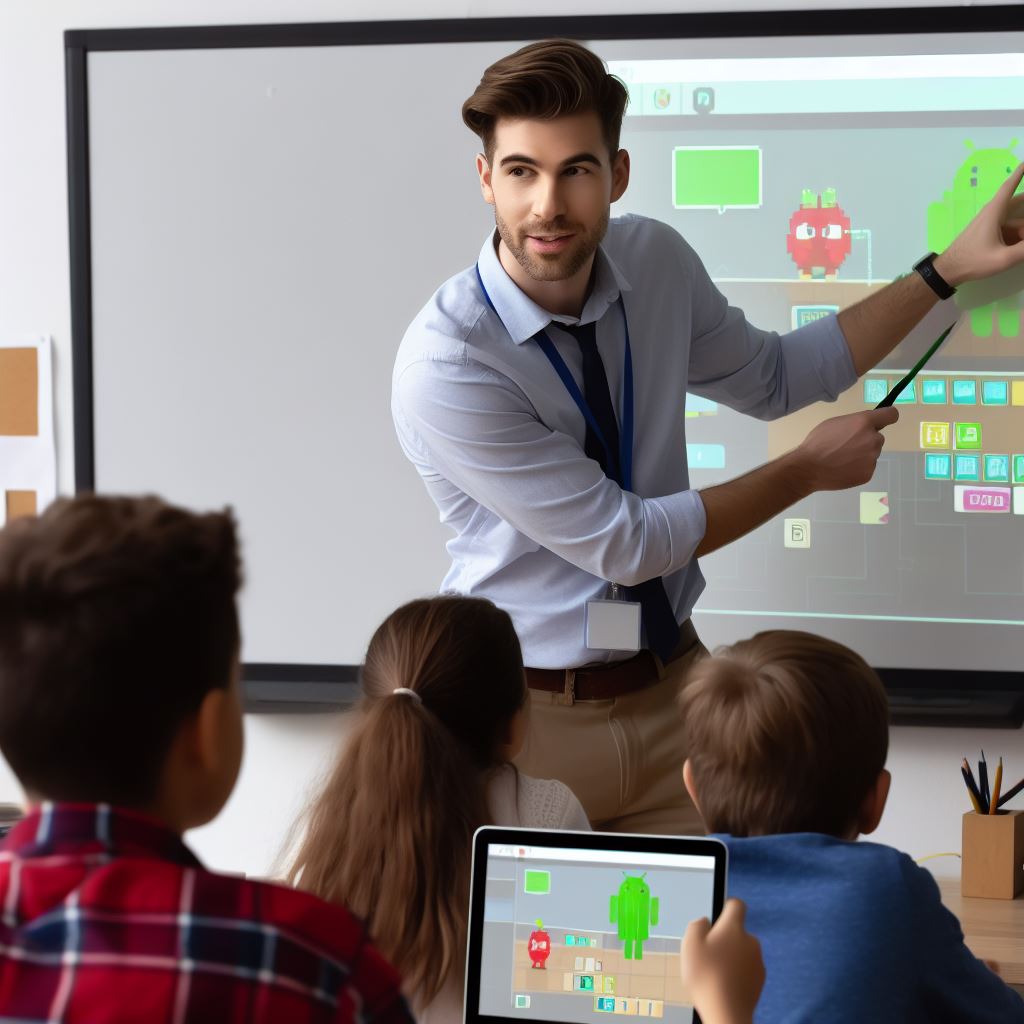Introduction
Coding practice for kids is an essential skill in this digital age, as it allows them to become future-ready.
A. Importance of coding practice for kids
Coding practice helps kids develop problem-solving skills and logical thinking abilities from an early age.
It also fosters creativity and enhances their ability to think critically and analytically.
B. Benefits of fun ways to learn coding
Learning coding through fun activities engages kids, making the process enjoyable and encouraging their interest.
By using gamification and interactive tools, kids can learn at their own pace and retain information better.
Fun ways to learn coding also promote teamwork, communication, and collaboration among children, improving their social skills.
These activities provide hands-on experiences, enabling kids to experiment, make mistakes, and learn from them.
In addition, coding practice enhances kids’ computational thinking and improves their academic performance in other subjects.
Basically, coding practice for kids is crucial for their development in the digital age.
Fun ways to learn coding provide numerous benefits, including the development of problem-solving skills, creativity, and critical thinking.
By making coding engaging and interactive, kids can learn at their own pace while acquiring valuable skills for the future.
Read: Tips for Improving Your Coding Problem-Solving
Fun Coding Games and Activities
A. Coding games and activities suitable for kids
Coding practice for kids doesn’t have to be boring.
There are plenty of fun coding games and activities available that make learning a delightful experience for children.
Let’s take a closer look at some of the best options:
Tech Consulting Tailored to Your Coding Journey
Get expert guidance in coding with a personalized consultation. Receive unique, actionable insights delivered in 1-3 business days.
Get Started1. Blockly
Blockly is an excellent starting point for kids who are new to coding.
It introduces them to visual programming and allows them to create simple programs using blocks.
This hands-on approach is engaging and helps children grasp the basic concepts of coding.
2. Scratch
Scratch is a popular coding platform that enables kids to unleash their creativity.
It allows them to create interactive stories, games, and animations by simply dragging and dropping code blocks.
Scratch helps children think logically while having fun.
3. CodeCombat
CodeCombat combines engaging gameplay with coding challenges, making it a compelling tool for teaching kids programming.
It introduces them to programming languages like Python and JavaScript while exploring a fantasy world filled with exciting adventures.
4. Robot Turtles
Robot Turtles is a board game that teaches programming concepts to young kids.
It enhances their problem-solving skills by challenging them to navigate a maze using basic coding commands.
It’s a great introduction to logical thinking and algorithmic problem-solving.
5. Code.org’s Minecraft Hour of Code
Minecraft is a game loved by many kids, and Code.org’s Minecraft Hour of Code takes advantage of that.
It allows kids to learn coding concepts by using Minecraft as a visual programming tool.
They can build mods and add functionality to the game, making it a truly interactive coding experience.
Build Your Vision, Perfectly Tailored
Get a custom-built website or application that matches your vision and needs. Stand out from the crowd with a solution designed just for you—professional, scalable, and seamless.
Get StartedThese coding games and activities make learning to code enjoyable for kids. They provide a hands-on, interactive approach that keeps children engaged while they learn important coding skills.
Whether it’s creating animations, solving puzzles, or exploring a virtual world, these games and activities offer a fun way for kids to learn and grow their coding abilities.
So, if you’re looking for ways to introduce your child to coding or enhance their existing coding skills, give these games and activities a try.
You might be surprised at how much fun you and your child will have while learning together!
Read: Learn by Doing: Project-Based Coding Curriculum

Coding Projects for Kids
A. DIY projects that promote coding skills
One fun and engaging coding project for kids is creating a website.
They can design and code a basic website using HTML and CSS.
This hands-on experience introduces them to essential web development skills.
B. Building and programming a robot
Another creative coding project is building and programming a robot.
Kids can use robotics kits or coding platforms designed for children.
They learn coding concepts while building and controlling their own robot.
C. Developing a simple mobile app
Kids can also learn app development by developing a simple mobile app.
There are drag-and-drop platforms or beginner-friendly coding tools available.
Understanding the basics of app development and coding logic is essential for this project.
Optimize Your Profile, Get Noticed
Make your resume and LinkedIn stand out to employers with a profile that highlights your technical skills and project experience. Elevate your career with a polished and professional presence.
Get NoticedThese coding projects provide a fun and interactive way for kids to learn coding.
By engaging in hands-on activities, they gain practical coding skills and develop problem-solving abilities.
Let’s take a closer look at each project and the skills it helps foster.
D. Creating a website
Creating a website allows kids to unleash their creativity while learning coding skills.
They start by understanding the basics of HTML (Hypertext Markup Language) and CSS (Cascading Style Sheets).
By designing and coding a basic website, they develop an understanding of how different elements come together to create web pages.
E. Building and programming a robot
Building and programming a robot introduce kids to the world of robotics and coding.
They can use robotics kits that provide all the necessary components or coding platforms designed specifically for young learners.
By following instructions and assembling the robot, they learn how to implement coding concepts in a tangible way.
They can then use coding software to program the robot’s movements and actions.
F. Developing a simple mobile app
Developing a simple mobile app allows kids to explore the world of app development.
Using drag-and-drop platforms or beginner-friendly coding tools, kids can design and program their own apps.
They learn how to design user interfaces, implement functionalities, and test their creations.
This project helps them understand the basics of app development and the logical thinking required for coding.
Overall, coding projects provide an effective learning platform for kids.
These projects encourage creativity, problem-solving, and critical thinking skills.
Moreover, they introduce kids to real-world applications of coding, making the learning experience more engaging and relevant.
By actively participating in coding projects, kids not only learn valuable skills but also gain confidence in their abilities to create and innovate in the digital world.
Parents and educators can support kids in their coding journey by providing them with the necessary resources and guidance.
Online coding platforms, coding tutorials, and coding clubs are great sources to explore.
Regular practice and exposure to a variety of coding projects can help kids deepen their understanding and enhance their coding skills.
In essence, coding projects for kids offer a fun and impactful way to learn coding.
Whether it’s creating a website, building and programming a robot, or developing a mobile app,
these projects provide hands-on experiences that foster creativity, problem-solving, and critical thinking skills.
Engaging in coding projects equips kids with valuable skills, empowers them to be creators in the digital world, and opens doors to future opportunities.
Read: Effective Git Practices for Coding Collaboration
Collaborative Coding Communities
When it comes to learning how to code, collaboration is key.
Working together with others not only introduces kids to new ideas and problem-solving techniques, but it also makes the learning process more fun and engaging.
Let’s take a look at some online platforms that provide opportunities for collaborative coding:
A. Scratch Online Community
- The Scratch Online Community is a platform created specifically for young coders.
- Here, kids can share their projects and collaborate with others who are just as passionate about coding.
- They can receive feedback on their work and gain inspiration from the creative projects of their peers.
B. Codecademy Kids
- Codecademy Kids provides interactive lessons that teach coding concepts in a fun and interactive way.
- Kids can participate in coding challenges and quizzes to test their knowledge and skills.
- The platform encourages collaboration amongst its users, allowing kids to learn from each other and grow together.
C. Online Coding Forums and Communities
- There are several online coding forums and communities where young coders can connect with more experienced programmers.
- These communities provide guidance, support, and mentorship to help kids enhance their coding abilities.
- They also offer a space for kids to share their coding problems and solutions with peers.
By being a part of these collaborative coding communities, kids can enhance their coding skills in several ways:
1. Enhanced Learning Experience
Collaborating with other young coders exposes kids to different coding techniques and problem-solving approaches.
By learning from their peers, kids gain a broader understanding of coding concepts and develop their own unique coding style.
2. Building Communication and Teamwork Skills
Working with others in coding communities helps kids develop communication and teamwork skills.
They learn how to effectively communicate their ideas, collaborate on projects, and work towards a common goal.
These skills are valuable not only in coding but also in various aspects of life.
3. Increased Motivation and Inspiration
Being a part of a community of like-minded individuals can boost a child’s motivation and inspire them to keep learning and exploring coding.
Seeing the creations and accomplishments of their peers can ignite their creativity and drive to excel in coding.
4. Exposure to Real-world Coding Practices
Collaborating with experienced programmers in coding communities gives kids exposure to real-world coding practices and industry standards.
They can learn from their mentors’ experiences and gain insights into what it takes to be a successful coder in the professional world.
In short, collaborative coding communities provide an excellent platform for kids to learn and grow in their coding journey.
Platforms like the Scratch Online Community, Codecademy Kids, and online coding forums foster collaboration, learning, and inspiration.
By actively participating in these communities, young coders can enhance their coding skills and pave the way for a successful future in the world of technology.
Read: Learn Data Science for Free: Top Online Resources
Conclusion
A. Emphasizing the Importance of Fun Coding Practice
- Fun coding practice for kids is the key to fostering a love for programming.
- It enhances problem-solving skills, creativity, and logical thinking from a young age.
- Engaging activities make learning enjoyable and sustainable.
B. Encouraging Parents and Educators
- Parents and educators should embrace a variety of resources like coding games, puzzles, and interactive apps.
- Hands-on coding activities should be encouraged, such as building simple websites or programming robots.
- Let children explore, experiment, and learn at their own pace.
- Remember, the future is digital, and coding skills are invaluable.
Incorporating these principles into teaching coding not only prepares kids for the tech-driven world but also ensures they have a blast while learning.
Happy coding!




